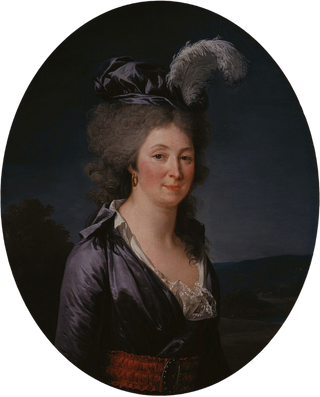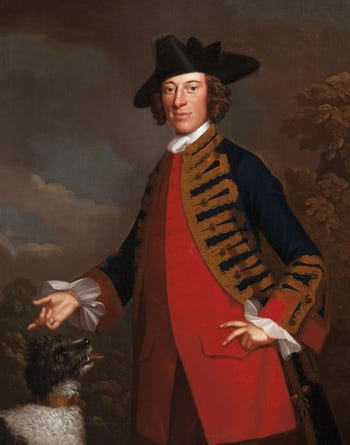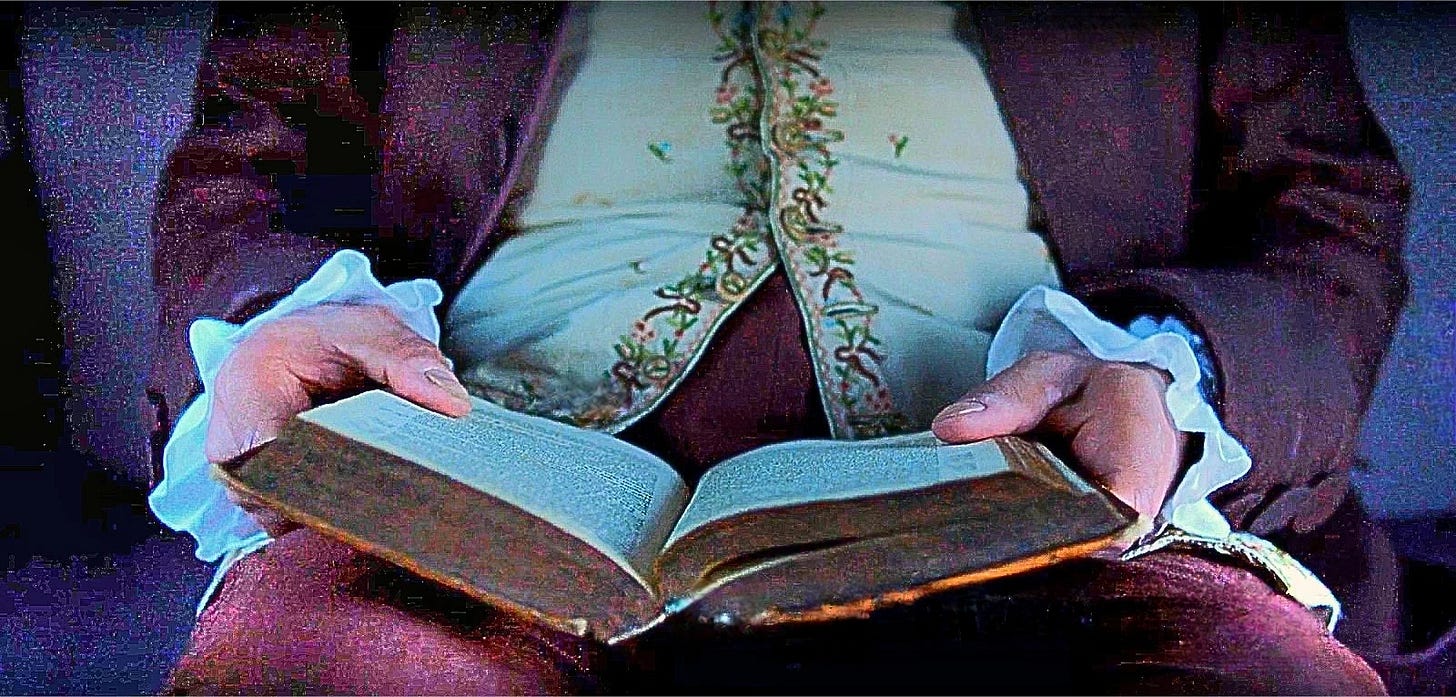The Difference in the Music
Gouverneur Morris and the Ethics of Feeling
I. “Not Formed to Succeed There”
While in Paris Gouverneur Morris was in more Ways than one a real Unicorn. As an American he was a Foreigner in a peculiar political Position; tied to America as a Revolutionary, a Founder, and Penman of the Constitution and tied to Britain by his Pre-Revolutionary Past and unofficial Work for George Washington and Thomas Jefferson. But unlike the Latter of the two Slaveholders, he never felt at Home at the Courts.
“This Visit, short as it is, and the first I ever made to a court, has convinced me that I am not formed to succeed there.” 1
He noted in his Diary after TJ took him to Versailles.
His aristocratic Manners (“Morris was told by Madame de Lafayette that she considered him an Aristocrat”2 * ) his Constitutionalism and his Proficiency in French would have predestined him to succeed. But despite being mistaken for a Courtly Insider Morris remained instinctively and intellectually apart from the polished Society of Versailles.

Where others observed the lower Echelons of Society from their Palace Walls and from inside lavish Salons, Gouverneur watched it from the Streets, walking or riding fearlessly and harmlessly through Paris alone, unguarded, and unafraid. It was there, among the Noise and Hunger of revolutionary France, that he confronted the Sights most of his Class preferred not to see.
II. Street-Level Conscience
He wrote to his half-Brother, General Staats Long Morris, himself a Symbol of the old American Order and at the Time residing in England, not a distant Account of a Foreign Statesman and Diplomat, but the raw Self-Reflection of a Man who saw and could not look away.

A devastatingly honest and sharp Analysis. A rare Mix of acute Observation, social Critique, personal Confession, and genuine moral Conflict.
All without once falling into Sentimentalism or Moralizing :
“In effect, none of the beggars I have seen complain to me of cold. They all ask for the means to get a morsel of bread, and show by their countenance that by bread they mean wine. And if the vintners were to interpret this last word, the poor devils would find that it means a very different kind of liquor. Among the objects which present themselves, doubtless some are deserving of charity, but these are scarcely to be noticed in the crowd of pretenders. However, they get from me all my small change, and I must confess, to my shame, that I give rather for peace’ sake than through benevolence.
The rascals have, I suppose, found out by studying human nature that each man loves himself better than his neighbor, and therefore makes it his interest to give. The rich, in return, as patrons of industry, are vastly inattentive to these importunities, and by withholding their alms try to make it the interest of the others to work rather than to beg.
The effects of habit on each are wonderful.Not long since I saw a gentleman of my acquaintance weep at an air of an opera, who had heard a beggar clatter his crutches in pursuit of him for the length of a street without turning round to look at him.
‘Tis true there is a difference in the music. ” 3
I find the Contents of this Letter truly remarkable, so let me unpack it and look at it in Detail.
III. On Giving and Guilt
📌 He identifies the System-Level Failure.
“Among the objects which present themselves, doubtless some are deserving of charity, but these are scarcely to be noticed in the crowd of pretenders.”
Gouverneur acknowledges true Need is buried beneath a Sea of Desperation. But rather than blaming the Beggars, he sees that the System forces them into Performance. “Pretenders” become the only Ones noticed, because quiet Dignity dies in Hunger.
📌 He confesses his own moral Flaw.
“I must confess, to my shame, that I give rather for peace’ sake than through benevolence.”
This is brutally candid and his Wording differs substantially from performative Guilt. Morris admits, he gives only to silence his Discomfort and not because he is good. And he calls it “to my shame”. Self-Awareness of the highest moral Order. Much more than many People today manage in public or private.
What Morris either does not see (which I doubt) or does, and this is his clever Way of Self-Flagellation where Absolution was required: His Motive for Giving matters not, because his Action is Benevolence either Way. I think he chose the Word deliberately for it is doing a lot of quiet Work in that Sentence. I doubt he was oblivious to that Fact, so I have to assume his self-deprecating and self-over-moralizing Posturing toward his Brother, could stem from actual Guilt as Self-Justification for his Generosity. A Spending Habit deemed reproachable.
Another Angle is hyper-Moralizing in a classically Protestant or perhaps even Stoic Sense: The preemptive Absolution of his Brother’s Guilt. A Device and Move Morris uses a lot, especially when writing or talking to someone he cares about, pertaining to Things that matter to him emotionally. He is basically saying: “If my Actions made you feel Guilt for practicing less Benevolence, I am guilty of Hypocrisy because the Good I did was not from pure Love.”
Either way the Outcome remains the same:
He gave selflessly and willingly.
He helped.
Not only the Self-over-Moralizing and the clear Justification, but many Scenes of his later Diaries he kept during his Travels through Europe point to another one of Gouverneur’s most beautiful Qualities (or biggest Vice in the Capitalist World we all live in): He tended to give too much.
He knew when he got robbed, and gave anyway. Often Times he would leave out a Bargain or double-book Expenses to avoid simple Discomfort or serious Conversation. He also gave large Sums of Money to People who wronged him and never asked for it back. He always valued his personal Peace above the Money. And he never lost Sight of the Circumstances at the Time of the Spending to justify himself.
So in the Incident mentioned in the Letter, it is entirely possible that Gouverneur was giving more than he let on. Systemic Unfairness haunted him and left him quietly furious that Alms were the only Tool left to him. Diminishing the Act is the logical Strategy to avoid acknowledging just how painful it is, that he could not do more.
He knows, Charity is not Justice. He knows, Motive does not feed anyone. And yet, he still gave and felt guilty for not being more virtuous. It is an emotional Double-Bind some of us are all too familiar with. So I see it - also and ironically - as deeply virtuous Consciousness.
IV. Born an Aristocrat, Made a Revolutionary
📌 He understands how the Poor manipulate the Rich... and vice-versa.
“The rascals have, I suppose, found out by studying human nature that each man loves himself better than his neighbor, and therefore makes it his interest to give.”
This is a brilliant Observation. Morris does not condemn it. He respects the Psychology. He sees how Begging becomes Strategy. But what could be expressed in pure Cynicism, Gouverneur puts out as Realism laced with deep Empathy.
It is a repeated Undertone of his entire Life; The Tension between inherited Privilege and radical Empathy. The Core of Gouverneur Morris’ Character.
He was born an Aristocrat profiting from Crown-favored Land Grants and Colonial Hierarchy. But unlike his Peers he did not cling to Status. Instead his personal Conscience shaped by Reason and Ethics and sharpened by lived Observation drove him toward Revolution instead Conservatism in 1776. His choice of Federalism over Royalism was obviously never Self-serving, but Self-aware. Self-critical even:
a Rejection of the System that made him.
This made Morris unique among the Founders as well. Others born to Privilege, owning Lands and Slaves like the Washingtons, the Jeffersons, the Livingstons, the Jays, remained emotionally tied to the Systems they claimed to resist. Others born without, like Hamilton, or Lafayette, clawed their Way up, only to replicate and defend those same Systems once they had Power.
📌 He saw from 1776 into the year 2025.
“The effects of habit on each are wonderful.”
The Effects of Habit on each are even more pervasive today, than in his own Time:
When a well-off Person puts the expensive organic Vegetables back on the Shelf because “there is a cheaper Option”, while People working multiple Jobs must rely on Food Stamps, it is not ignorance. It is systemic. It is Habit. A deeply ingrained Blindness to Poverty, which is no longer the Exception but the Structure.
How modern Societies deal with Poverty is the logical and long-standing Consequence of the “remarkable habit” Morris described. The current State of the greatest capitalist Injustice in Human History is no longer seen as Cruelty, but as a Reflex so long rehearsed, it transformed Discomfort about others’ Suffering into rationalized Distance. When even Millionaires complain about the Cost of Living, the Result is not Hypocrisy. It is a System, that has learned to believe its own Lies.
But Gouverneur Morris never lied about the Game. He complained about its unfair Rules, and never ever forgot those, who were not allowed to play.
He walked Palace Halls and still heard the Clattering of Crutches in the Street.
V. Empathy as a Political Model
📌 He roasts the Rich.
“The rich, in return, as patrons of industry, are vastly inattentive to these importunities, and by withholding their alms try to make it the interest of the others to work rather than to beg.”
A coldly rational System still in Place all over the World today; withholding Help to incentivize Labor is inhuman in its Economics to Morris. In 1789 he was skeptical that People can be moved to Self-Sufficiency by Cruelty, if the System does not hold them.
Morris’s pragmatic Compassion has clear Policy Echoes today. The moral Fatigue of Giving, the manipulative Necessity of Begging, and the cold Rationality of the Rich withholding Aid which Morris described, is still the main Logic underlying modern Welfare Systems.
For Example in Germany, where the twenty-year old Hartz-Concept tries to “incentivize labor” by keeping Payments deliberately low (often described as "zum Sterben zu viel, zum Leben nicht genug" (too much to die, too little to live). This punitive Scarcity does not reduce Poverty. It produces it. Purposefully. Willingly. Because the ruling Class which thrives in Capitalism does not want a Democracy of informed People.
Experiments with Bedingungslosem Grundeinkommen (Unconditional Basic Income) reject the Idea that Dignity must be earned through Suffering. They assume just like Morris, that people when free from Desperation, make better Decisions. Mr. Morris’ often misunderstood Caution about too expansive a Democracy during the Constitutional Convention never stemmed from Elitism, but from this exact Awareness. Mixing Rich and Poor in the lower Legislative House would lead to an Oligarchy with the wealthy controlling the Government.
Sound familiar?
His Fear was extremely based, not just considering his own Time, but ours too. He also came to see firsthand the Proof of it and how Oppression breeds Extremism when the brutal Revolt of impoverished Mobs in France turned violent. A Democracy in which the Poorest are neglected will eventually be hijacked by the Angriest; and his Solution was Prevention not Repression. By giving every Citizen Rights to their Bodies and Existence. Something to lose and thus something to vote for.
This made Gouverneur Morris a true Republican. Not in the misused modern partisan Sense, but in the original classical one: someone who believed in a Government of Laws grounded in civic Virtue, guided by Reason, and designed to protect the common Good. He was never advocating Aristocracy like most Historians still put it. It is a Contradiction in Fact to what he said, wrote, and stood for in his Lifetime spent warning of Despotism and Oligarchies in the pre-Civil War United States, pre-Revolutionary France, and pre-War of the Third Coalition Great Britain.
As an American through and through, Morris was trying to guard the young Republic from collapsing under the Weight of economic Despair weaponized by the upper Class. He knew that for Democracy to work “We the People” must be educated, fed, and free, not manipulated, starving, and scared. Republicanism in its purest Form.
VI. The Clatter of Crutches
Now this to me, is absolutely Stunning.
“Not long since I saw a gentleman of my acquaintance weep at an air of an opera, who had heard a beggar clatter his crutches in pursuit of him for the length of a street without turning round to look at him.”
At first Sight Gouverneur Morris uses Irony to condemn performative Sentimentality. He writes of an Acquaintance, who weeps at Art, but ignores real Pain — obviously not just critiquing a Man, but eviscerating the Aestheticism of the Elite.
Using himself.
Because this is him. Literal and Symbolic.
A Gentleman, who cries in the Theater?
That is Morris.
“Go thence to the french Play where the honnète Criminel well acted drowns in my Tears all Thought of my own Situation. Oh God I humbly thank thee for that Sensibility which thus opens my Heart to fancied Joy and Woe.” 4
And a Man with a Leg Disability, walking the Streets of Paris?
Well…
"’Tis true there is a difference in the music."
This is the Fracture:
What gives a Man Permission to feel?
The Gentleman capable of deep Feeling, who allows fictional Sadness, but cannot bear to look and see the Man suffering outside the Performance, even though he hears the constant Clatter of Crutches. Because he knows, what it is to be in Pain.
So he judges both; the Man crying at the Opera and ignorant of the Beggar, and himself, even more harshly. It is his own Tears, he does not trust. His own Alms, he cannot defend. His very own Conscience, he keeps cross-examining.
This Fracture of Gouverneur Morris’ Self-Image was not performative. He knew he was not heartless, but he feared being performatively good. He feared his Virtue was a Mask, because it was for everyone else and he reached to adapt. And yet, the Irony is; this very Self-Doubt, this Refusal to let himself off the Hook, is what made him good in the first Place.
I truly believe (and I will keep delivering Receipts in this Blog) it is, as his Friend Madame de Damas wrote. She knew him deeply and he had rescued her from Imprisonment, the Guillotine, and her abusive Husband in more Ways than one.

“Were I called upon to distinguish him by a single trait, I should say he is good.” She wrote in her acute verbal portrait. “Much in the term of goodness” and she saw “the exercise of his virtue in every action of Mr. Morris’ life.” 5
So where does Gouverneur’s deep Insecurities and the Dissonance in his own Perception to that in the Eyes of Others come from?
This is the psychic Marrow of Mr. Morris.
Not what he thought, but why he thought in Contradiction to how Others saw him.
Why did he speak of himself with so much moral Suspicion or frame himself as ethically insufficient, even privately, and despite the Facts, that he was obviously intelligent, highly perceptive, humane, honest, and fair in his Approach to literally every other Person he knew?
Gouverneur Morris’ social Position was a Riddle he could never solve. He was an Aristocrat by Birth, but a Revolutionary by Intellect and Instinct. He was welcomed at Versailles, but did not belong. He was admired in Salons, but did not trust it. He walked among Beggars, but could not fix their Plight. He wanted to help, but he knew too much to pretend that Charity was enough.
VII. A Man Who Would Not Look Away
Gouverneur lived in constant existential Vertigo. His entire Life was a Performance in a Room he did not ask to be in, for Audiences who kept switching Masks. So he became used to critiquing himself, before others could do it. Starting as early as his first public Oration, when he was made Valedictorian at King’s College (now Columbia) as the youngest ever Graduate at the Age of 16 6. But this. I will cover in a separate Essay.
Fact is, he was too intelligent to be at Peace with himself. He could never delude himself to the aristocratic Myth. He could quote Shakespeare, Ovid, Machiavelli, and Voltaire from Heart, but he also saw the Bodies, real World Injustice produced. He forever failed to romanticize his Place in the World, but he could not leave it behind either, which left him constantly stuck between two Selves:
The Actor, who knew the Play is false, and the Man, who could not step off the Stage.
And the Stage — back then already — was Patriarchy and Capitalism.
And in this World Compassion is Weakness.
Morris spent a Lifetime watching powerful Men reward Ruthlessness, Cruelty, and Brutality. From the duplicitous Thomas Jefferson, to his Friend Alexander Hamilton, acting like a Knife in his Back, to his Mentors Robert Morris and George Washington, who used him only, when it served them. Even his War Comrade the Marquis de Lafayette and his Wife exploited him financially. And his own Family, who saw him as a walking Inheritance only, and then spent Decades trying to ruin his Wife and Child after his untimely Death. And then came the Terror. And he had to watch kind People with best Interests at Heart getting beheaded because of their Birth.
To understand Gouverneur Morris is to understand a Man, constantly torn between what he was born into and what he believed in. A Man, who could command any Room, but only ever wrote himself into the Margins. A Man, who tried to never be cruel, even when Life begged him to be.
His true Revolution was emotional Integrity:
The Idea, that a Man’s Soul is measured by what he refuses to look away from.
The Idea, that Grief and Empathy are not unmanly, but Evidence of a functioning Conscience.
So in Conclusion it is I, who is unjustified in viewing his strategic emotional Preemption as Insecurity. For he was truly not just ahead of his own Time,
but of everyone else too.
Including himself.
Notes:
Morris, Anne Cary. The Diary and Letters of Gouverneur Morris. Trow’s, 1889. p. 33.
ibid. p. 35-36.
* in ibid. p. 155. Sept. 16th, 1789 Morris visits Adrienne de Lafayette, the Comtesse de Tessé, at Versailles upon his return to Paris from London, and claps back on her statement from months ago with “We have a gay conversation of some minutes on their affairs, in which I mingle sound maxims of government with that piquant légèreté which this nations delights in. I am fortunate, and at going away she follows me and insists that I dine with her next time I come to Versailles. We are vastly gracious, and all at once, in a serious tone, ‘Mais attendez, madame, est-ce que je suis trop aristocrate?’ She answers, with a smile of gentle humiliation, ‘Ah, mon Dieu, non.’”
ibid. p. 38-39.
Miller, Melanie Randolph. The Diaries of Gouverneur Morris. University of Virginia Press, 2011. p. 60.
Miller, Melanie Randolph. An Incautious Man. Regnery Gateway, 2008. p. 206.
Sparks, Jared. The Life of Gouverneur Morris Vol. 1. Gray & Bowen, 1832. p. 11.


